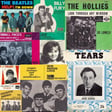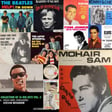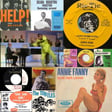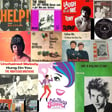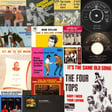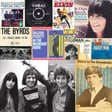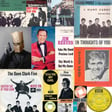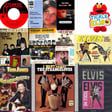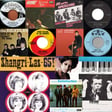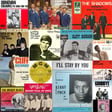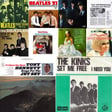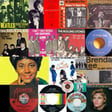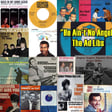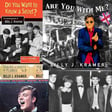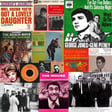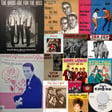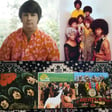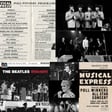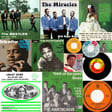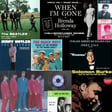Become a Creator today!Start creating today - Share your story with the world!
Start for free
00:00:00
00:00:01

July 1965 (side A)
July of 1965. Cook and Greenaway, the Dave Clark Five, the Animals, Joan Baez and PJ Proby. All this and a feature covering the radio of 1965 with Rob Leonard! #madeonzencastr. Support this podcast at the $6/month level on patreon to get extra content! Also, Create your own podcast today! #madeonzencastr
Recommended
Transcript
The Beatles' Motivational Chant
00:00:01
Speaker
The Beatles had this chant, John, Paul and George, and probably then Stuart and Pete, had this chant when things weren't going well, which in their world wasn't very often because mostly it was an upward trajectory, but nonetheless, sometimes you they would have a bad night or the gig didn't work properly or the amps broke or whatever.
00:00:20
Speaker
i say, where are we going, fellas? And they'd go, to the top, Johnny. And I'd say, where's that, fellas? And they'd say, to the top-a-most of the pop-a-most. I'd say, right. And we'd all sort of cheer up.
00:00:32
Speaker
Where are going, Johnny? Straight to the top, boys. Oh yeah? Where's that? The toppermost of the poppermost.
Introduction to British Charts July 1965
00:00:45
Speaker
Welcome to toppermost of the poppermost, the British charts for July of 1965. I'm Ed Shin. I'm Kido Choole. And I'm Martin Quibble. Our feature for July is AM, FM, and the change in radio in
Discussion with Rob Leonard on 1965 Radio
00:01:06
Speaker
1965.
00:01:06
Speaker
Yes, indeed. And we have a very, very special guest that's going to help us go through this important period in radio history and the Beatles' relation to radio and Other songs that we've covered and you know how the charts are, Mr. Rob Leonard, who is one of the co-hosts of the long-running Fab Four Free For All podcast.
00:01:30
Speaker
You also probably know him from radio and, of course, from fests. Rob, thank you so much for being on our show. And don't forget Beatles songs Fridays on WHPC streaming at NCC radio.
00:01:44
Speaker
Thank you for going. It's a great show. You do not want to miss it. So so let's talk radio. It's always a fun topic. Where I want to start is what exactly happened to Wins 1010?
00:01:56
Speaker
In 1965, 1010 Wins became an all-new station. They were the first... That is my question for you. I guess it was back in December we heard about the announcement from Murray the K that WINS was no longer going to be a pop rock station.
Transformation of WINS 1010 to All-News Format
00:02:12
Speaker
And then, as you noted, on April 19th, they switched over to All News, which they are still to this day. But considering the way we think of WINS 1010 and we think of it as the Beatles station,
00:02:25
Speaker
No, no. that Murray the K was the guy. But if you really look into, especially for New York, ABC was very connected to the Beatles, 64, 65, and 66. Cousin Brucie, find a way to interview or get involved with them. A couple of others too, Dan Ingram, uni until he left.
00:02:45
Speaker
INS was more Murray the K. What were the main AM Top 40 stations in New York?
AM Top 40 Stations in New York
00:02:52
Speaker
Well, there was three. Well, four, really, but three that people would know.
00:02:57
Speaker
There was W.I.N.S. with Murray the K was the main guy. And, of course, ah they're listening to I.N.S. in the Malus Brothers documentary. where They're going to read their poetry, and they're you they're not going to.
00:03:09
Speaker
Then, of course, WABC. And they had Cousin Brucie, they Dan Ingram, a lot of people there. Scott Muni in 64. And then the third station in New York would be WMCA. Now, WMCA was technically the first station to play a beatles record in new york though Murray the K says he played She Loves You in September of 63 when Swan released it.
00:03:33
Speaker
I've yet to come across that tape. Now, like I said, he probably didn't tape it either because who the hell were the Beatles? It's hard to believe, you know, in September, it's like, who are the Beatles? And three months later, it's like, oh, my God, it's the Beatles.
00:03:45
Speaker
And that's how radio reacted to. And so MCA, Jack Spector was the first guy in New York to play it. Matter of fact, when he left MCA, I found a tape of him talking about some of the prideful things he was doing. You know did it at MCA. And one of the things he says, I was the first one to play.
00:04:01
Speaker
I want to hold your hand. Now, he said in the country, that's not true.
Impact of Radio Charts on Music Popularity
00:04:04
Speaker
But in New York, it was. But WABC jumped on it right away, too, like literally the same day almost. And New York was a good place. We had three top 40 stations in New York.
00:04:14
Speaker
ah Not every city had three stations or even two stations that played top 40, especially York. in 1964 or 65. or sixty five So you mentioned the fact that most larger markets tended to have two competing pop rock stations.
00:04:31
Speaker
Here in Houston, there was KNUZ and there was KILT. And yeah as you go through the American tours, You will
Strategies to Attract the Beatles
00:04:38
Speaker
repeatedly see these stories of one station to the other trying to get the Beatles tour to come to their town.
00:04:45
Speaker
Was there just that much market share for them to be able to do that, both Beatle-wise and for pop rock? don't know. That's a good question. I'm in the middle of this project. The Beatles and American radio.
00:04:57
Speaker
And it's so hard to find clips. A town wouldn't have ah the Beatles coming to them would try to get the audience to send in cards or something so they can show the Beatles how much...
00:05:09
Speaker
They're loved in their town. So I think that's part of it. You know, there was just something to grab onto. And that's what they were always looking
The Rise of FM Radio and Youth Culture
00:05:17
Speaker
for. You know, anything to do with the Beatles. In Houston, didn't you have the weird beard, Russ Knight? We did indeed have the weird beard. The weird beard is the one who introduced the show here. I mean, everybody knows it because we have a soundboard of both the afternoon and the evening show.
00:05:32
Speaker
I've heard that tape and it's really good quality. So, but I always thought it was maybe broadcast on Kilt. as I guess it's called. And I'm i'm not sure. There is that scene with the weird beard yelling at the audience.
00:05:45
Speaker
You know, so, and and of course he's known as the weird beard and he always had to have a beard for the rest of his life. And all he had was a, you know, he said he just had a Van Dyke basically. You know?
00:05:55
Speaker
Now, one thing you mentioned talking about all these personalities, I mean, this must have been quite an adventure for many of them. I mean, these weren't young guys. Yeah. on
Cousin Brucie's Influence and Beatles Interviews
00:06:05
Speaker
the radio. Cousin Brucie was like the youngest and he was 30 in 1965. He turns 90 this year, God bless him, and still doing WABC every Saturday night.
00:06:16
Speaker
He was 30, but all the other guys, they were older. you know Harry Harrison was older, Dan Ingram, Herb Oscar Anderson. They were older guys. And sometimes they talk about it but at the same time it was the part of it was the latest fad and the Beatles stayed around but you know some others didn't you know the Dave Clark Five you know disappears you know Jerry and the Pacemakers disappear Freddy and the Dreamers disappear The Stones come up in 65 more than 64 to me at least so there's a slight generation gap where they're talking to the audience but they're the jocks and sometimes they're better promoting themselves Dave Hull
00:06:56
Speaker
out in KRLA was was really good with that stuff. And Brucie was great with it too. So it depends on the jock. It depends on how young they were. It depends if they liked the music. And that's why FM comes in in a couple of years and it's a little different because those people are much younger and closer to the age of the people listening.
00:07:14
Speaker
What was the role of the blowtorches? I know that there were certainly AM stations which could be picked up when the weather conditions were correct, basically across the entire country.
00:07:25
Speaker
Did they play a role in the Beatles coming across to places where kids might not have otherwise had access to them? Well, that's a good question. The blowtorches would be 50,000 clear channel.
00:07:37
Speaker
So that's WABC. 1010 winds is 50,000 watts. WLS would be a clear channel, 890. I don't know the other ones off the top of my head. ah WABC hit 38 states at night, and Cousin Brucey was on during that time, so he had this audience. And you've got to also remember, AM radio doesn't sound the way it does anymore for many reasons. Part of it is there's so much electronic noise in the air.
00:08:04
Speaker
that interferes with the AM. So, you know, back then, AM sounded really good. You hear it now because of all the interference, it's not the same. So that's part of it. WABC, if you're hitting 38 states, you're basically hitting to the Mississippi. That I have not looked into, but that's a a good point.
00:08:22
Speaker
You know, WMCA in New York was 5,000 watts. They had a weird signal where ratings-wise, they always lost to ABC, but if you went specific neighborhoods in Brooklyn,
00:08:33
Speaker
and in queens you would get really big ratings but they have a signal of like a donut so the middle for some reason wasn't heard but the outside of the donut was i don't get that but that's what i've been told but other stations probably wwdc was about those fifty thousand watch but that was a big station in dc wb a l KBW Buffalo.
00:08:57
Speaker
They had Joey Reynolds up there. That was more 64, but he, he was a big shot up there
Influence of W-O-A-I in San Antonio
00:09:03
Speaker
in Buffalo. That's part of it. I don't know what the 50,000 clear channel stations are in Texas or Houston.
00:09:10
Speaker
W-O-A-I was the blowtorch in South Texas. O-A-I, what town was that? San Antonio. That's way they do it. they They set it up and they say, okay. but that's a good question about the blowtorch. I mean, ABC was was the station, so so many people listened to it. But MCA had its following.
00:09:28
Speaker
They broke music much faster than ABC. they But they also took more chances, and by the end of the 60s, they were gone. So they went to be a talk station. So, Kit, do you have any more before we move on to Radio and Shay?
00:09:43
Speaker
and Yeah, one thing, and this would kind of apply to 65 as well, stations had their own charts. If you could talk a bit about how they were compiled, what kind of influence they would have on larger sales.
00:09:58
Speaker
They got their information from different places, and there wasn't a lot of there wasn't record stores the way we grew up on. you know Sam Goody probably sold records. I assume Sam Goody was around then.
00:10:10
Speaker
And Corvettes, ah yeah here in New York, Corvettes was actually a big seller of records. They had a great record department until Corvettes closed. And so they would call up places.
00:10:22
Speaker
You've got to remember, but Macy's sold records. The only reason I know that is because i've bought records that had a Macy's sticker on it you know so and a and s You know, the department store sold records. So wherever ABC or MCA or LS or wherever they got their information, I assume they would call up and say, OK, what was selling this week? And then they put the chart together like, you know, everyone else. So I think that would be part of how.
00:10:49
Speaker
It all worked because they said, okay, this is what's sold and this is what we're going to play next week. ah But at the same time, people were then here then maybe buy the record more. Or maybe they already bought then they move on to the next song.
00:11:02
Speaker
The thing about the charts were, though, any record didn't stay on a chart as long as they do today. Yeah, that's true. Hey Jude on the Billboard chart was on for 19 weeks.
00:11:14
Speaker
Nine of them were at number one. And that's their biggest selling song ever. And at the same time, only 19 weeks and nine of them are number one. that means 10 weeks. It wasn't number one. And that's not really a long time. So when you think about it, you know so songs stay on the charts much, much longer. So that's why, like, you see Taylor Swift, you know, she's like the number seven artist of all time.
00:11:37
Speaker
and also digital downloads and streaming is also part of the fun and they include that now in the in the charts from billboard so taylor swift should be at number seven but everything gets charted if you look at the billboard book the kids from glee there's like 150 records are charted but okay this song's only on there for two weeks it debuted at number 80 and went to number 70 and that's it but it's just different how they did a lot of things the charts would be one of them but they had their own charts and that's that was very important because they wanted to make sure they were playing what was popular and they i guess they either wanted their own thing or they just didn't trust the other places to get information you know cash box billboard
00:12:21
Speaker
record world. So, all right, that moves us into the preparations for Shea. Murray was one of the co-hosts. Where was he since Wins was no longer there as a radio station?
00:12:34
Speaker
o I don't know. I know Brucie was the main host. Murray was there for the New Music Express show in England. And that was weird because how many people in England knew who he was? You know, he was able to weasel his way in.
00:12:47
Speaker
That's the way he was. know, that's and he He was a showman. He was also in the middle of the Around the Beatles thing. Remember that kid? Oh, yeah, that's right. I thought that he might have been too much in the Beatles 64 movie, but they've had all that footage. Getting back to radio in 65, I'm in New York,
00:13:07
Speaker
you ABC started to change a little bit, but the music was changing also. Muni had left ABC. Cousin Brucie moved into the 7 to 10 spot, which was Muni's spot, and he became even more popular. and Brucie's one of the few people to interview the Beatles each year, 64, 65, and 66.
00:13:24
Speaker
He interviewed them at the Warwick Hotel. 64, he interviewed them, and then in 66,
John Lennon and Media Pressure
00:13:31
Speaker
he got the interview when you know the whole thing was more popular than Jesus.
00:13:36
Speaker
And Bruce being Bruce didn't really talk about the politics. i don't if they said not to. I don't think they did. But he didn't bring it up because that's how he does things. so And it worked out very well. The interview is actually a nice interview.
00:13:50
Speaker
And if you listen to it, Paul does a lot of answering. And if you look at the 66 press conferences, Paul is protecting John from some of this question. And I didn't realize that until this project I'm working on because I've come across some of the press conferences.
00:14:04
Speaker
And, you you hear Paul talking a lot more than maybe he did in 64. So, you know, protecting your friend is what it's all about. Now, you mentioned about the music changing, too, and that brings up a point that some of our listeners have mentioned and and we've certainly discovered is in 64, you know, when the Omini was really taking off, we had always been taught, oh, when the Beatles came along, they just changed everything.
00:14:31
Speaker
The charts, all the previous acts from like the 50s and early 60s, they just dropped off the charts and the Beatles and, and of course, other British Invasion bands dominated.
00:14:42
Speaker
But as we've been doing this show, we've discovered that wasn't exactly true. It was a bit slower than that. And there were plenty of artists like Al Martino and others who were still on the charts having some hits. And you mentioned that had to do with radio formatting.
00:15:02
Speaker
Anyways, I wonder if you could talk a little more about that. on Top 40 would play anything that's sold. So Al Martino or Frank Sinatra or whoever, if they were selling, they would include it.
00:15:12
Speaker
Sinatra had That's Life as a hit. That's a great song. and But it also was a you know top 40 song. you know Something Stupid, that also had Nancy on it. But that's also another Sinatra song that did good. Al Martino 64 did some stuff.
00:15:26
Speaker
stuff And some weird instrumentals show up and, you part of it was just the way they did the charts, the radio stations, know, it's top 40, so it's all based on sales. Today it's not always based on sales. Sometimes it's based on, well, we're only going to count these people, we're going to count the others.
00:15:42
Speaker
You know, find a rock song on a top 40 station, you're not going to find it. And there's plenty of rock being released, it's just not being played on a top 40 station. So that's part of it. Some bands just disappeared literally on February 9th or February 10th.
00:15:57
Speaker
But the Beach Boys didn't. The Four Seasons didn't. you know, they had bunch of hits. So part of it was the Beatles came along and, you know, think about it. You know, they they were on how many different labels? They were on VJ, Capitol, Swan,
00:16:12
Speaker
Tali or Toli, however you pronounce it. So that helped the Beatles because if they were all on Capitol, the stations wouldn't have played them. But since they're all spread out on different labels, they're like, oh okay, we can do that.
00:16:24
Speaker
And then, of course, they would bring in stuff from Canada. Let's get all my loving and roll over Beethoven over the, you know, let's get that as part of our thing now. So you're right, it was slower probably.
00:16:35
Speaker
It's easier to say, you know, on February 10th, everything changed, and it did. You know, with Steven Van Zandt, we interviewed him on the Fab Four Free For All, and he said on February 10th, every guy wanted to be in a band, whether they had musical talent or not.
00:16:49
Speaker
And that didn't happen. People started buying guitars. and that didn't happen before that. But the Beatles had their own look and their own feel, and you know but I think that was part of what led to what happened in 65 with different types of bands.
00:17:05
Speaker
The folk scene breaking out, the Byrds, Simon and Garfunkel. I thought the Stones always broke in 65, even though there was more 64, because of satisfaction. It's interesting how by 65, things had really changed.
00:17:19
Speaker
And not just for the Beatles, you know, but for a lot of other things. And the Beatles were influenced and influenced in others. you know the You know, Rubber Soul very much a folk album, at least the American version, more than maybe the British version.
00:17:32
Speaker
And, of course, that influenced so many American acts, including the Beach Boys. So the Beach Boys were influenced by the American version of Rubber Soul, especially Brian. Oh, Brian Wilson, let's not say I know him, I don't.
00:17:45
Speaker
And that led to the Beatles being influenced by Pet Sounds. So it trades off and they were putting out music really fast, not just the Beatles. It's not like today where you you wait three or four years for a new record.
00:17:58
Speaker
It just changes. So that's a good point. Now, another thing that changed a lot was that 1965 was the last year that AM radio really dominated that, as you kind of alluded to earlier.
00:18:12
Speaker
you know, FM really starts 66, 67, depending on the city. But ratings wise, It wasn't that influential really until Pepper, when Pepper comes out because they play the whole record. FM really kicks in about 68-ish.
00:18:29
Speaker
NEW becoming it. WNEW in New York was a big deal. But WOR came in in 66, and that was a big deal also. WOR, FM, I should say. you know They had Muni. They had Murray the K. They had a lot of.
00:18:44
Speaker
different things going on Roscoe was there too so that's when FM starts pulling away some of the listeners who grew up in 64 they were let's say they were 15 or 16 you know two three years later they're getting ready go to college and the topics they're talking about are different you know the the way the jocks presented themselves were different they weren't talking over songs they weren't high on coffee or something you know they were like hey man how you doing you know the whole hippie talk But that's when people started to listen to, and and then the jocks had the freedom to pick what they wanted, which meant a lot more songs were going to get played that weren't going to played on Top 40. ABC, top of the hour, let's play the new number one song.
00:19:23
Speaker
But that's how you keep your audience. If it's a new song, you want to hear it every hour. Sure. You especially if it's a good song. so it's just a little different you know so related to that there were what two government changes which allowed fm to at least start to come into prominence yeah the fcc said that fm radio stations couldn't just broadcast the am signal so they had to get original programming and that's where people like tom donahue in san francisco store goes that they start calling FM radio stations and the ones that didn't answer they figured they were on automation or whatever and that's the ones they called and then they offered their services and they said oh yeah okay and then it became but that's the only story I've heard with him in San Francisco in New York it was you know Metro Media, WNEW which was one of the most influential stations really for FM radio you know other people say well BCN
00:20:24
Speaker
Boston, i don't know which one's the one in Chicago. You've got to remember, Top 40 Radio, that's one of the reasons why FM comes into play, because it's aimed at the adults who have the kids, and they'll take their kids out or you know shopping or something.
00:20:39
Speaker
FM was aimed at the younger generation, whatever, I think that's where people start to say, well, I want to be talked to, not at. I think that's part of ah the fun thing. When you're looking at the history of radio and three of just young people at the time, there were so many more of them.
00:20:56
Speaker
They were all coming to age if they were baby boomers. So if you were born in 1947, you were 20 in 1967. And three years before that, you were 17. Or how many people were like 15 when in 1964?
00:21:10
Speaker
And like, wow, look, the Beatles are for me. Well, that's, I think, part of it. Not that the Beach Boys weren't, but... It's just a different look and a different thing. It's just so much to connect with.
00:21:22
Speaker
I'll let other people connect it more. All right. Thanks, Rob. you know It was great having you on. and We've learned a lot about radio 1964 and 1965.
00:21:33
Speaker
it's good time you know one thing about the Beatles it gave these jocks something to talk about which is very important because you know they can say oh the Beatles doing this or the Beatles are doing that or they're in England right now making a movie they had something to talk about and they didn't have the new setup that we have today even like the New York Times or the New York Papers they didn't have pop culture outlook.
00:21:55
Speaker
So part of it is the Beatles allowed radio to do this, and then other people started pick up on that also. So when you have something to talk about, you have a better radio show.
00:22:06
Speaker
People forget that. How can people find you online? How do they get a hold of you?
Connecting with Rob Leonard
00:22:11
Speaker
Okay, we got we got the Fab Four Free For All. There is a website called the Fab Four Free For All. You can get me through there. ah You can listen to my show on Fridays. I have a Facebook page, Beatles Songs on Fridays, 8 p.m. to 11 p.m., 90.3 WHBC.
00:22:25
Speaker
In Garden City, New York, streaming at nccradio.org. And basically that's it. mean, you know, can find me. i'll answer I'll answer any emails sent to me or if you want to message me on Facebook.
00:22:37
Speaker
Hopefully it's nice. All right. On to the charts on the UK side for the first week, the week from the 1st to the 7th of July. Marv, you want to lead us off here?
00:22:51
Speaker
At number one we've got Crying in the Chapel by Elvis, which goes from one to two to five to six. At number two, we've got I'm Alive by The Hollies, which goes from two to then having two weeks at number one and then down to number four.
00:23:08
Speaker
There was actually a cash box review of this that we will just quickly mention, where it says the Hollies are currently clicking in their native England with I'm Alive.
00:23:20
Speaker
and there's no reason why the tune can't become a like blockbuster on this side of the foam. i love that. Side of the foam. Yeah, there's the a like blockbuster as well. That's not helping my head at all.
00:23:36
Speaker
It's a low-key rhythmic romancer about a lad it was on cloud nine since he met the girl of his dreams. You know he did. He's a funky, pulsating weeper.
00:23:48
Speaker
with an infectious repeating riff. That's the B-side, by the way. At number three, we've got The Price of Love by the Everly Brothers, which goes from three to six to nine to 15.
00:24:01
Speaker
At number four, we've got Colours by Donovan, which goes from four to seven to 11 to 12. And then but number six, we've got Trains and Boats and Planes by Burt Bacharach, which goes from six 12 to 22 to 29. Over to All right, and got some good songs in this group here.
00:24:22
Speaker
Number 10, Anyway, Anywhere, Anyhow by The Who, which goes from 10 to 11 to 12 and then to 14. 11, Heartful Soul by The Yardbirds, which goes from 11 to 4 and then stays two weeks at number 2. 14, A World of Our Own by The Seekers.
00:24:43
Speaker
And it goes from 14 to 18 to 26 to 31. 15, To Know You Is To Love You by Peter and Gordon, which goes from 15 to 5 to 6 and then back up to 5.
00:24:54
Speaker
Number 19, Mr. Tambourine Man by The Birds, which goes from 19 there to 8 to 3 and then number 1. And finally, 22, one of my favorites, Maggie's Farm by Bob Dylan, ah which goes...
00:25:11
Speaker
It kind of goes up and down here, 22, 24, 27, 33. So it's actually on the way down, which I can't understand why it's a great song. It's pretty amazing.
00:25:22
Speaker
So, you know, you look at just the first half of the charts that we've already talked about. You got Elvis at number one, you got Everly Brothers at number three, but then you also have Donovan, the Who, the Yardbirds, the Seekers, and Peter and Gordon together.
00:25:36
Speaker
Yeah. And Dylan and the birds. That's right. Yeah. Quite a grouping there. wow At number 23, we have the next Dusty Springfield single, In the Middle of Nowhere, which moves from 23 to 13 to 10 to 9. The tune the tune is a little bit like Search into My Ears.
00:25:59
Speaker
The backing singers aren't the best. The drummer is overplaying. There's maybe just a touch too much jazz in this record. I'm also not sure about those horns.
00:26:10
Speaker
It's a great vocal from Dusty. The finger snaps work fine, but are maybe just pulled up a little bit too much on this record. Overall, I'll have to give it a low, low hit, and that's really only for the lead vocal.
00:26:23
Speaker
Yeah, I have to agree with that. It was a little sing-songy for my taste, and it also sounded to me like it was trying to be Motown with the drums and the girl group harmonies, but not nearly as good.
00:26:35
Speaker
And maybe that's where the jazziness comes from, because, of course, as we know, the Funk Brothers you know had that jazz background that they brought in.
00:26:51
Speaker
If what you say is true, why can't we be together? Over and over you tell me, I'm all that you're thinking of.
00:27:04
Speaker
Baby, you know that I love you, but I can't wait forever.
00:27:13
Speaker
Her voice elevates the song into something listenable, but definitely not one of her best. I'd say, nah, high, meh, low hit. Yeah, I'd like her voice a lot. The mix isn't great.
00:27:28
Speaker
It's a potentially good song with a bad production and a bad arrangement other than her vocal. I could probably see this done by ah vocal group as opposed to Dusty with backing singers. I think this would be better as a ah something by yeah Joe Brown's wife. What's the name of them again, their group?
00:27:46
Speaker
ah You're talking about the Vernon's girls. It's Vernon's with an S. Yes. Yes. I think it would have suited them as a vehicle for them themselves, personally. I think they would have worked as a vocal group song.
00:27:59
Speaker
Yeah, I could see that. And I forgot to mention when I talked about Motown, this song was co-written by Beatrice Verde, who it turned out spent six and a half years writing music for Motown.
00:28:10
Speaker
That explains it. Yep, that explains why it sounds a little bit Motown, yes. Yep. At number 26, Billy J. Kramer and the Dakotas versions of Trains and Boats and Planes, which only has one more week in the charts. It goes from 26 to 42, then out.
00:28:28
Speaker
At number 31, our old friend Kenny Lynch with I'll Stay By You, which moves from 31 two weeks at to number At number 39, When the Summertime is Over by Jackie Trent, which moves from 39 to 46 to Out of the Charts.
00:28:48
Speaker
This song was written by Tony Hatch, her husband. Yeah. The accompaniment was directed by Tony Hatch. It sounds like bad Seekers to me. Not a great tune, and I don't like those strings.
00:29:02
Speaker
The guitar over the fade feels like nothing more than twangy rubber bands.
00:29:42
Speaker
It's another record saved only by a good to excellent lead vocal, but in this instance, it's only enough for the record to be a meh, not even a high meh. Once again, we're in agreement. It's really frustrating because Jackie Trent had a great voice, but then she would be handed material like this.
00:30:01
Speaker
The harp is way overdone, particularly in the beginning. You knew when that harp was starting, I thought, oh no. we walk along
00:30:22
Speaker
This is not going to be good. Very busy arrangement. And it's like it's trying to be this tearjerker and trying to be emotional, but it just comes off as overwrought.
00:30:34
Speaker
There's some interesting chord changes, but other than that, very average song other than her vocals. Yeah, I like the music of this, the melody that's there. And I like some of the chord progressions that are going on and some of the interplay here and there.
00:30:50
Speaker
but there's just something lyrically that to me feels like a first pass lyric. Yeah. But other than that, I do like air voice a lot, but it just needed tweaking a bit and the arrangement was just slightly off.
00:31:06
Speaker
Agreed. I think the whole tune needed to be rewritten, not just the arrangement. Absolutely. At number 46, a weird record. thing That's the way love goes by a gentleman who calls himself Charles Dickens.
00:31:23
Speaker
It moves from 46 to 38 to 45 to 39. Do you think that this is something that they rigged to be something, oh, oh it's it's British. The Americans will love it. They love anything British right now.
00:31:38
Speaker
It could be, but certainly sounds out of place no matter what. So Charles Dickens was the pseudonym used by British fashion photographer David Anthony when he briefly had a career as a pop singer.
00:31:52
Speaker
We'll talk more about this in a minute, but David Anthony would marry Jeannie Shrimpton's sister. We all know who Jeannie Shrimpton is, don't we? Yes. Yes, the model. So Jeannie and her sister Chrissy, the girl who would marry David Anthony, kind of had a high-rent Boyds thing going on.
00:32:12
Speaker
Patty was not quite Jeannie Shrimpton, and Jenny was not quite Chrissy Shrimpton. Yes. As to this tune...
00:32:34
Speaker
And you don't speak, I can't help it baby if I cry, the teardrops just keep rolling from my eyes, that's the way love goes, the way love grows.
00:32:54
Speaker
It's decent enough. It's a very by-the-numbers 50s style tune. I think of it as a lesser Paul Anka Pat Boone with ever so slightly more solo, though that's not hard when we're comparing it to those two.
00:33:09
Speaker
The end of the tune has a rip-off Beatles chord change. I've lost your love and it shows I've lost your love
00:33:37
Speaker
The piano is perfectly adequate. The backing singers are karaoke level. The drums and organ are okay. Low man for me. Oh, big time Lomad. I thought it was just a snore. I mean, it sounded like it could have been released in the 50s, maybe early 60s, but it just had that throwback feel and not in a great way. I thought, quotes Charles Dickens, as a pretty average voice.
00:34:04
Speaker
I mean, I didn't think it was a great vocal performance. I thought the organ solo toward the end was really weird. Just didn't add to anything. Very cliched lyrics.
00:34:16
Speaker
Loma, for sure. Well, now you know he wasn't a singer. He was a photographer who was swinging London at the time. And Andrew Lou Goldham said, hey, you can be a singer. You look good enough.
00:34:31
Speaker
As a singer, he's a great photographer. There you go. Yeah. ah Oh, dear me. I don't know whether this is at all possible, but I think I like it even less than the both of you.
00:34:44
Speaker
It's not good. I was about ready to fetch a defibrillator for this. Kit and I will go lo-meh. You'll actually go all the way into missed territory on this. There's just enough charm for it to be a lo-meh, but that's it for me.
00:34:58
Speaker
I think we'll have problems bringing this thing back to life. The song might be better if the musical arrangement wasn't so boring, alongside a vocal that doesn't get much life to it beyond that of a basic demo recording.
00:35:12
Speaker
Yep, it's a snore. Absolutely. Before we leave, we do have some at least nominal Beatles connections. As mentioned, David Anthony, or Charles Dickens as he is, was a creation of Andrew Lou Goldham.
00:35:27
Speaker
Thanks, Andy. The final single from Charles Dickens would include the Jagger Richards tune, So Much In Love, which we have previously seen from the Mighty Avengers.
00:35:37
Speaker
but but yeah Oh, not those Avengers. Sorry, yeah. There is one and only one reason to listen to that record. The arrangement is a complete ripoff of Wouldn't It Be Nice. That's right.
00:35:51
Speaker
Yep. Wouldn't it be bad?
00:36:22
Speaker
Also, as mentioned, David Anthony would marry Chrissy Shrimpton, sister of Jeannie, who, yeah, I guess to the younger folks, younger in quotes, might recognize that name from behind the wall of sleep from the smithereens. She had hair like Jeannie Shrimpton back in 1965.
00:36:40
Speaker
nineteen sixty five And then there's a famous collection of photos of Paul in a NASA astronaut suit. Yep. I remember those. Yes.
00:36:52
Speaker
Draped on Paul in some of those photos is Jeannie Shrimpton in a swimsuit and goggles. Which makes complete sense. Absolutely. I'm still trying to get Paul in the astronaut outfit out of my head. Yeah. yeah He never puts on the helmet, but he is in the suit.
00:37:11
Speaker
Yes. And this was a pre-Photoshop day, so they actually had to get a suit from NASA to put Paul in. Of course. Why didn't Paul go up in space with Bill Shatner?
00:37:24
Speaker
I'm imagining both of them singing Lucy in space together. Yeah, there you go. At number 47, I Can't Help Myself by the four tops, which goes from 47 to 44 to 23 to 24. We've already covered that on the U.S. side.
00:37:42
Speaker
yeah We move on to the second week on the U.K. side, the 8th to the 14th of July. At number one is I'm Alive by the Hollies, which stays at number one for another week and then moves to number four.
00:37:57
Speaker
At number 32, There But For Fortune by Joan Baez, which moves from 32 to 16 to 11. eleven It's an intense folk song.
00:38:08
Speaker
Acoustic guitar,
Joan Baez's Experience with the Beatles
00:38:09
Speaker
powerful vocal, very much a protest song. It's pretty, but it's driving. a hit but one that really needs to be listened to when you're in the mood when it's a specific place and time show me the prisoner whose life has gone stay and i'll show you
00:39:03
Speaker
It's Joe Baez we're talking about. So gorgeous vocals, very passionate. I love her guitar on this. Fingerpicking is really great. And it's essentially a story of, you know, there but for the grace of God go I. I mean, another way to put it Any of us could be poor, a hobo, an alcoholic.
00:39:23
Speaker
So before you pass judgment on them, just think, could be you. It's not particularly the song to my taste, but she performs it extremely well.
00:39:34
Speaker
So I'll give it a low hit just for her incredible vocals and guitar playing. Okay. I'd probably like it a little bit more. I think Joan's voice is beautiful, as is the guitar playing that she's doing as well.
00:39:49
Speaker
And I'll give kudos or points to the production because it's not easy to make a simple vocal and one acoustic guitar sound as big as this does.
00:40:03
Speaker
And it does sound big production wise for just those two elements. You can actually hear the room that playing in. It's got a really nice reverb and atmosphere to the production to it that I really enjoyed.
00:40:16
Speaker
And as we know and will discuss, Joan Baez spent some time with the Beatles. She tells of that incident in a Rolling Stone interview from 1983, which we don't think is quite correct, but we'll get to that after we read this excerpt to you. Kit, why don't you start off?
00:40:36
Speaker
Okay, ah so Joan said, I traveled with the Beatles for four days on one tour and ended up with John at one point, but we certainly did not have anything. I mean, it was wild times.
00:40:50
Speaker
I was performing in Red Rocks above Denver, and they were on the next night, so I stayed over. There I was in this room full of hundreds of people, all scrambling around trying to figure out how they could get to their dressing room, and somebody came up and said, the Beatles would like to meet you.
00:41:06
Speaker
And I just instantly went to jelly. I got to their door trying to think of something clever to say and finally just put out my hand. And one by one, they introduced themselves. Now, they had been on the cover of every single newspaper for months. And they're going, hello, I'm George. And my name's Ringo.
00:41:24
Speaker
i said, yes, I know. They were terribly funny and terribly sweet. And they invited me to stay on the road for their last three or four concerts. My tour was over, so I went with them, as I think anybody would have.
00:41:38
Speaker
You know, packed everything and whoop-de-doo, off we went. I saw all the inner workings, how you climb into Volkswagen buses and then send the limousine out to be beaten to death by loving fans.
00:41:50
Speaker
All those things. I was fascinated. Then we ended up in this great big mansion in Los Angeles that somebody had given them. But big as it was, there weren't really enough master bedrooms for everybody.
00:42:04
Speaker
And poor John was the one who had invited this little Mexican waif along. Oh dear. I don't know what the hell they thought of me.
00:42:15
Speaker
They thought I was Florence Nightingale because I used to tend to the wounded at their concerts. Anyway, so here we are in the mansion in Los Angeles and we've run out of bedrooms and they've sent their people out to bring in groupies so they can pick who they're gonna, you know, hang out with.
00:42:34
Speaker
And these poor girls just sitting downstairs waiting to see whether they're going to be picked by somebody. They don't talk. They don't even knit. They just sit in these little outfits that they've worked on for months, waiting for this thing to happen.
00:42:48
Speaker
And eventually a VTL will come by and pick one of them and, you know, drag her off to his lair. There was also a hotshot local somebody. ah didn't figure out exactly who she was, but she looked like a professional prostitute.
00:43:02
Speaker
Oh, dear. Oh, well, even in the States, we know these things were going on. Yes, true. Her quote ends as follows. Anyhow, John was stuck having invited me and then not having anywhere to put me.
00:43:18
Speaker
So he offered me his room. It had a bed in it the size of a small swimming pool. I said, well, John, don't worry. I'm not fussy about these things. You just come in and use the other side of the bed when you are tired.
00:43:31
Speaker
I had tired in quotes, I think. Yep. I didn't want him to feel pressured because I figured they must feel pressured to perform all the time. So I went to sleep and he came in in the middle of the night and I think he felt compelled.
00:43:46
Speaker
Well, I've asked her here, and she is a star, and oh dear. And he started coming on to me very unenthusiastically. I said, John, you know, I'm probably as tired as you are, and I don't want you to feel you have to perform on my behalf.
00:44:03
Speaker
And he says, adopting a liver puddley and accent, Oh, lovely. I mean, what a relief. Because you see, well, you might say I've already been effed downstairs. So we all had a good laugh and went to sleep.
00:44:15
Speaker
Charming.
00:44:17
Speaker
Now, thing about this story is we do know that Joan Baez was with them on the 66 tour, but she has confused the details a little bit. Yeah. She seems to have think it was the 64 tour when this happened.
00:44:34
Speaker
The Beatles played the Hollywood Bowl on August 23, 1964. The Beatles played Red Rocks on the 26th of August, 1964. And Joan Baez played Red Rocks two days later the 28th. nineteen sixty four and joan baez played red rocks two days later on the twenty eighth Baez was also off for the next month from August the 28th to September the 23rd.
00:44:55
Speaker
But the Beatles had already left because they had another concert after Red Rocks, and there's no sign that Joe and Baez hung out with them on the 64 tour. But... but We do know that she hung out with them in California on the 66 tour. There's a great picture of the Beatles and our friends, the birds who we're going to be talking about real soon at a party in Los Angeles at a mansion belonging to one of the Capitol records executives.
00:45:23
Speaker
oh great photo it doesn't seem to be john that joan baez is ah hooking up to she she seems to have her hand at or near a shirtless george harrison's knee yeah that's right yeah but yeah they're they're all just hanging out by the pool and having a good time once again you look at this it's like yeah boy were those boys skinny Yeah, they sure were.
00:45:49
Speaker
Wow. The birds actually had more meat on their bones than the beetles did at that point. o yep And this was when John Lennon claimed to have been in his fat period.
00:46:00
Speaker
Yeah, hardly. wo yeah There's not much material on those shorts. So we know that this was when Joan traveled with them because we also have photos of her backstage at Candlestick.
00:46:14
Speaker
Johnny Cash would also go backstage and the Beatles and Joan Baez would decorate a tablecloth. So we had that story. The tablecloth was sold for charity.
00:46:29
Speaker
It was actually hung up in the restaurant owned by the gentleman who won the auction. And then it was stolen for many years and just discovered within the last four or five years.
00:46:40
Speaker
Oh, wow. So we actually have pictures of Paul there drawing on the tablecloth and Joan Baez with her sketchwork here on the tablecloth. Yes. At number 33, Let the Water Run Down by PJ Proby.
00:46:55
Speaker
Good old PJ's back. Yeah. Who moves from number 33 24 to 22 with this
00:47:26
Speaker
It's a blatant Elvis impersonation. Surprise, surprise. It's not a terrible copy, but boy are those backing singers dreadful. It fails at being Viva Las Vegas in the middle, and you know it's got that deep I'm alright, which I just don't like.
00:47:42
Speaker
It's good enough to be a medium meh, but it still feels like something the real Elvis might have thrown out halfway through his first performance of it. Yeah, definitely. You just think, wow, he's he's really perfecting, so to speak, his Elvis impersonation, isn't he?
00:48:01
Speaker
This song has kind of a Bo Diddley beat, but much faster. agree with you, those background singers. like I mean, they were high-pitched. It really got on my nerves, and particularly when they were singing, bop, bop, bop, that part.
00:48:15
Speaker
That really irritated me. And I agree with you when he drops his voice to sing Elmo right. I mean, it just borders on like Elvis parody. I just couldn't stand that.
00:48:26
Speaker
Too much reverb on the vocals and the instruments. Low meh for me, if that. Right. Louise is in for you. Ready? All right.
00:48:37
Speaker
Louise says that it's like listening to an Elvis tribute act at the local club where the first prize is a box of potato chips.
00:48:48
Speaker
And I'm going to add to that, he really does lays it on. Ah, I got it. I got it. It might be better if someone did this that wasn't trying to sound like Elvis Presley and not doing a bang-up job of it.
00:49:04
Speaker
do Meh. At number 37, you've got your troubles by the fortunes. which moved from number 37 to number 18 to number 10.
00:49:15
Speaker
This is a tune by Roger Cook and a Roger Greenway. It's slightly Bacharach alike. It's a nice tune, but it is the sort of ballad that everyone likes to pretend Paul McCartney writes.
00:49:28
Speaker
Mm-hmm. ah Good performance. The trumpet drives the record. The only thing I really don't like about it is that I lost my lost my little girl talkie bit in the last verse.
00:49:41
Speaker
And so forgive me, I say to you, my friend, that I ain't got no pity for you. Oh, I ain't true. You see, I lost my, lost my.
00:49:59
Speaker
you've got your troubles I've got mine you've got your troubles I've got mine
00:50:14
Speaker
And indeed, Paul McCartney knew that the Lost My Little Girl thing was cliche when he wrote his very first song. So, you know, still low hit. Yeah, I mean, there are elements of this that I like. It's catchy.
00:50:27
Speaker
Definitely Beatles like in harmonies and chord changes. And in fact, I found out that Cook Greenaway sent their demo of of You've Got Your Troubles to George Martin.
00:50:38
Speaker
Like, oh, that explains the Beatles-like sound. Like the horn arrangement and the trumpet and guitar solo, you know, with the kind of plucking to go along, know, kind of answering the trumpet was a nice change of pace, you to something a little different.
00:50:52
Speaker
I did not like that counterpoint vocal of I Lost My Little Girl. i agree that was totally unnecessary. But it has some elements to it that, yes, I would agree low hit. Wow, we've all picked up on that bit. Right.
00:51:05
Speaker
I like the vocals on this and the music. Luis says that this is a song that smacks of the 60s and not in a bad way, but in a good way. But I personally never liked that bit that you were mentioning because it it it just...
00:51:19
Speaker
It sticks out like a sore thumb. Just for those couple of lines, you've got this one vocal that comes out away from everybody else that does those couple of lines, and then it's back to how it was for the rest of the song. It just spoils what was a decent song.
00:51:33
Speaker
Yeah, whose idea was that? Totally unnecessary. No. So as you mentioned, the demo Cook and Greenway did indeed end up on the desk of George Martin, and George Martin was interested in having them record that song.
00:51:52
Speaker
However, George was busy producing another quartet. Rubber Soul was taking up most of his time at that junction. So the Fortune's version ended up being recorded and coming out before...
00:52:07
Speaker
the Cook and Greenway version could be recorded. But George Barton did indeed have the duo cover Michelle. Yes.
00:52:18
Speaker
So we're going to see that real soon now because that will be a top 20 hit in both the U.S. and U.K. and go all the way to number one in Canada.
00:52:28
Speaker
wow Wow. Now I know you're saying, I don't recognize those names. Well, because the duo was billed as David and Jonathan, which is one of those names that Beatles people do come across pretty quickly when they start going down that rabbit hole.
00:52:44
Speaker
Mm-hmm. So... You Got Your Troubles was featured on the 1966 David and Jonathan album, which was self-titled in the UK and titled Michelle for US.
00:52:56
Speaker
They would also go on to record a cover of She's Leaving Home. Oh, wow. Also produced by George Martin, just after the Beatles version in Pepper. Wow.
00:53:07
Speaker
Famous because, well, it's George Martin's opportunity to arrange She's Leaving Home. Yeah, that's right. Since he didn't get to do that. Original recording. yeah He never forgave Paul for that, did he No, he did not. so...
00:53:23
Speaker
and so Because of the Beatles connection, we're doing a super cut of You've Got Your Troubles, starting off with the David and Jonathan version, an instrumental version billed only as Mr. 12-string guitar.
00:53:40
Speaker
you know I love that they could put out albums with just nom de plumes like that. you know There's that infamous Lord's Sitar album. Oh, right. Yes. yeah So this is very much along the same lines. We include it because it has since been revealed that Mr. 12-string guitar was none other than Glen Campbell.
00:53:58
Speaker
ah Oh. Yeah. Other versions. Kit's gal Brenda Lee. h Firecracker, that's right. Peter and Gordon. Sammy Davis Jr. Oh my gosh. Wow.
00:54:11
Speaker
Frankie Valli. o Wayne Newton. Neil Diamond. yeah Our other favorite guitar player, Billy Strange. And one, Ronnie Spector.
00:54:23
Speaker
Wow. Ronnie Spector. Hey. So now you see why we decided to do a supercut of this song. Yeah, you had to. Yeah, definitely. That's got by Newton. course you got to do it.
00:54:40
Speaker
see that word red look On your face You got your trouble, well I got mine She found somebody new to take your place You got your trouble, well I got mine
00:55:21
Speaker
Now just like you. You got your troubles, I got mine. You need some sympathy.
00:55:36
Speaker
Well, so do I.
00:55:42
Speaker
You've got your troubles, I've got mine.
00:56:11
Speaker
We were walking and we were talking
00:58:04
Speaker
So forgive me, if I see one time. You got your mine. Hi, Adam.
00:58:29
Speaker
you got your troubles got mine
00:58:50
Speaker
um
00:58:53
Speaker
At number 43, Moonglow by our other instrumental friends, Sounds Orchestral, which would move from 43 to 44 to out of the charts.
00:59:06
Speaker
It's a pretty jazz riff, performed well. I like the piano, but I think I would have liked it more if it were a bit more up-tempo. If I were to select a version of this well-known song to listen to, I'd have to go with one of the classic ones, Ellington or Cab Calloway or Benny Goodman.
00:59:23
Speaker
but this one serves in a pinch. Low hit. First of all, I love the song, Moon Glove. I mean, that is one of the classics, you know, standards. Just beautiful.
00:59:34
Speaker
Absolutely beautiful. This version, i didn't love it. You hope someday someone will
01:00:05
Speaker
I wonder why he's free to stand aside It's cause he's got no love to stand aside
01:00:16
Speaker
I thought there were too many flourishes on the piano. Borderline corny for me. I mean, it was a little too, sorry again, fans of this person, but Lawrence Welk, for my taste, it was kind of bordering on that.
01:00:30
Speaker
I agree with you. i would definitely go with the versions you mentioned. I'd also add from the MTV Unplugged album that Tony Bennett did, He did a beautiful version, and it was a duet with Katie Lang.
01:00:43
Speaker
And their voices just worked so well together. Minimal arrangement. got Ralph Sharon on there. and You can't go wrong. So I would say, yes, go with any of those other versions. So I'd say high math for me.
01:00:56
Speaker
Yeah. This version sounds like a band that's playing in the background at a bar somewhere. lounge version. That's funny. So a message to anyone inside the club where this band's playing right now.
01:01:11
Speaker
Don't eat the bar snacks. Don't forget to tip your waitress. That's right. She's doing a good job and she gets treated like beep. Yeah. Alright, just a little bit of history on this record.
01:01:24
Speaker
Moonglow is also known as Moonglow in Love. It was a 1933 popular song and jazz standard written by Will Hudson and Irving Mills, and the words came later by Eddie Delange.
01:01:38
Speaker
In the 1950s, a medley of the song and George Dunning's theme from Picnic, orchestrated by Johnny Warrington, became quite popular, especially in an instrumental recording by Morris Stoloff, conductor of the film version by the Columbia Pictures Orchestra, and that is the version of this tune that we get here.
01:01:56
Speaker
Mmm. Gotcha. At number 48, He's Got No Love by The Searchers, which moves from 48 to 31 to 18. eighteen It's an odd but interesting record.
01:02:09
Speaker
It's somewhere between Hard Day's Night and Proto's Psychedelia. ah The combination of the 12 string and 6 string guitars is really pretty interesting. This would be the Searcher's first self-penned hit, although Chris Curtis says they stole the tune from the last time, which actually to me is really only transparently obvious in the last verse.
01:02:45
Speaker
It's not a great record, but I'm glad I heard it. Low hit.
01:02:57
Speaker
to know someone who kill him it's not a great record but i'm glad i heard it low hit Yeah, very unusual, not only for the searchers, but for the time in general.
01:03:09
Speaker
From the very beginning, that kind of twangy sounding guitar is bit surprising. then it kind of abruptly switches to a fairly standard British invasion pop song. And then there's that bit in the middle with that psychedelic sound you were referring to.
01:03:32
Speaker
It was almost a harpsichord kind of sound. Really unusual. I didn't care for the drumming on this. I thought it was sounded a little clunky, and the heavy reverb turned a little too high on this track. Sometimes the vocals were almost overshadowed. But for kind of experimental reasons for this period, I'd say low hit.
01:03:53
Speaker
Yep, fascinating for that exact reason. They were experimenting. They tried something different, arrangement-wise and otherwise. The reverb, it sounded like they'd thrown a microphone into a dustbin and recorded it from that at times.
01:04:09
Speaker
It did. And that was not a good sound. Good that they experimented with it, but the engineer should have, you know, after doing that said, yeah, that's good. But yeah, perhaps we'll um not do that in the future.
01:04:22
Speaker
Yeah. All right, the final song in this episode at number 49 with these hands from Tom Jones, which moves from 49 to 33 to 21.
01:04:34
Speaker
twenty one This is not the Tom Jones that I prefer. It's all Welsh croon here. i don't like that orchestration. The piano is good, but maybe overused a little bit on this record.
01:04:46
Speaker
Let the power of Tom's vocals come through. For what it is, it's a low, low hit, but not really something I want to listen to. Exactly. I like the Tom Jones, you know, that we've, of course, seen on here before. You know, What's New Pussycat? It's Not Unusual, where he really gets to show off those strong vocals.
01:05:04
Speaker
And, you know, with kind of a wink. I mean, you know, kind of thinking, hey, these these songs are a little campy, but I'm cool with that. I'm going to put 100% into it. This one is almost trying to sound a little Elvis-like, which it's like, come on, you're Tom Jones. You don't need to do that.
01:05:22
Speaker
Long after stars have lost their glow
01:05:50
Speaker
Oversings it a bit, over emotes. You know, it's like trying to make this song something. As I said, I like the campier, soulful outings. I was kind of glad when this was over.
01:06:02
Speaker
So I'm not sure if I'd even rate a man. Maybe it's even a miss. Tom doing his best on a song that I don't think has got a very good production to it. The echo is not good, especially when the pianist plays. You can hear a note...
01:06:17
Speaker
two or three times after the note's been played. It just rings and rings for ah ridiculous amount of time. i hate that I'm picking up on these things.
01:06:27
Speaker
I carried on with that, Tack, and I'm like, a better engineer would have a mic in a room in the room on one track to get that. And another microphone would be inside the echo chamber or the plate room, as they used to call it in studios.
01:06:41
Speaker
And then they'd mix them separately to create a nice reverb sound as opposed to what they've done. All right. We will be back real soon with side B where we're going to finish out the British side for July of 1965. See you then.
01:07:00
Speaker
See you soon. Take care.
01:07:19
Speaker
There was a piece in the NME, a news piece, that said that Top Rank records, remember when Top Rank had a record label? and They introduced an LP series next week that will be called Toppamos and is coinciding with their current advertising slogan Toppermost of the poppermost.
01:07:38
Speaker
They got it from somewhere. They saw that, they must have seen that in either the NME or record mirror or disc, record and show mirror as it was then. And they've taken it from there. They've obviously thought how stupid that is.
01:07:52
Speaker
How stupid is is one of those phrases that someone, an older person who doesn't understand teenagers comes up with a slogan that they think is gonna be the hip slogan of the month. Toppermost of the poppermost.
